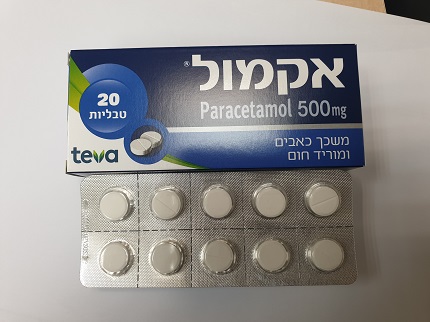Quest for the right Drug

אקמול ACAMOL (PARACETAMOL)
תרופה במרשם
תרופה בסל
נרקוטיקה
ציטוטוקסיקה
צורת מתן:
פומי : PER OS
צורת מינון:
טבליה : TABLETS
עלון לרופא
מינוניםPosology התוויות
Indications תופעות לוואי
Adverse reactions התוויות נגד
Contraindications אינטראקציות
Interactions מינון יתר
Overdose הריון/הנקה
Pregnancy & Lactation אוכלוסיות מיוחדות
Special populations תכונות פרמקולוגיות
Pharmacological properties מידע רוקחי
Pharmaceutical particulars אזהרת שימוש
Special Warning עלון לרופא
Physicians Leaflet
Special Warning : אזהרת שימוש
4.4 Special warnings and precautions for use Prolonged or frequent use is discouraged. Patients should be advised not to take other Paracetamol containing products , including cold and cough medicines concurrently. Taking multiple daily doses in one administration can severely damage the liver; in such case unconsciousness does not occur. However, medical assistance should be sought immediately. Caution is advised if skin side effects have been developed in the past as a result of taking products containing paracetamol, products containing paracetamol should not be used, so that severe skin effects will not recur. Prolonged use except under medical supervision may be harmful. Caution is advised if paracetamol is administered concomitantly with flucloxacillin due to increased risk of high anion gap metabolic acidosis (HAGMA), particularly in patients with severe renal impairment, sepsis, malnutrition and other sources of glutathione deficiency (e.g. chronic alcoholism), as well as those using maximum daily doses of paracetamol. Close monitoring, including measurement of urinary 5-oxoproline, is recommended. Caution is advised in the administration of Paracetamol to patients with moderate and severe renal insufficiency, mild to moderate hepatic insufficiency (including Gilbert's syndrome), severe hepatic insufficiency (child-pugh>9), acute hepatitis, concomitant treatment with medicinal products affecting hepatic functions, glucose-6 phosphatedehydrogenase deficiency, hemolytic anemia, alcohol abuse dehydration and chronic malnutrition (see section 4.2). The hazards of overdose are greater in those with non-cirrhotic alcoholic liver disease. Caution should be exercised in cases of chronic alcoholism. The daily dose should not exceed 2 grams in such case. Alcohol should not be used during the treatment with Paracetamol. Caution is advised in asthmatic patients sensitive to aspirin because light reaction bronchospasm with paracetamol (cross-reaction) has been reported in less than 5% of the patients tested. Caution should be exercised in patients with glutathione depleted states, as the use of paracetamol may increase the risk of metabolic acidosis (refer also to section 4.9). Use with caution in patients with glutathione depletion due to metabolic deficiencies. In the case of high fever, or signs of secondary infection or persistence of symptoms a doctor should be consulted. Immediate medical advice should be sought in the event of overdosage even if the patient feels well because of the risk of irreversible liver damage (see section 4.9). The leaflet contains the following wordings: Talk to a doctor at once if you take too much of this medicine even if you feel well. This is because too much paracetamol can cause delayed, serious liver damage.
Effects on Driving
4.7 Effects on ability to drive and use machines Paracetamol has no influence on the ability to drive and use machines.

שימוש לפי פנקס קופ''ח כללית 1994
Mild to moderate pain, antipyretic
תאריך הכללה מקורי בסל
01/01/1995
הגבלות
תרופה שאושרה לשימוש כללי בקופ'ח
מידע נוסף
